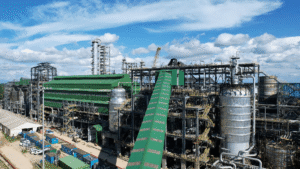Largest Bamboo Biofuel Plant of $1.3 Billion, lands in Ghana: Kambic’s Project

Ghana is poised to take a major leap in the global clean-energy transition as Kambic Industrial Partners announces plans for the $1.3 billion Amaaba Bio-Refinery Complex, set to become Africa’s first industrial-scale bamboo biomass refinery and the world’s largest bamboo-based biofuel facility.
The project marks a strategic turning point not only for Ghana’s energy landscape but also for the wider African push toward sustainable industrialization. By tapping into the continent’s abundant bamboo resources, the refinery will produce biofuels capable of reducing carbon emissions, lowering dependence on imported fossil fuels, and supplying cleaner energy for transport and industrial use.

Beyond its technological significance, the initiative carries profound human and social benefits. The refinery is expected to generate thousands of jobs across the value chain, from bamboo cultivation to processing, logistics, and engineering. For many rural communities, bamboo farming could become a stable source of income, offering farmers an alternative to timber-related deforestation and unsustainable land use practices. Development planners also expect the project to spur new small enterprises, particularly in seedling production, nursery development, and community-based harvesting cooperatives.

Politically, the announcement strengthens Ghana’s positioning as a regional hub for climate innovation. As global pressure mounts for greener energy, the project allows the government to showcase concrete progress toward its climate commitments while attracting long-term foreign investment. The scale of the investment signals confidence in Ghana’s regulatory environment at a time when many African nations are competing for green-energy capital.
Socially, the bamboo refinery represents an opportunity to reshape narratives around African industrialization, moving from raw commodity exports toward value-added, globally relevant manufacturing. Environmental advocates note that bamboo, a fast-growing and regenerative plant, aligns well with sustainable development goals, particularly when cultivated under community-led stewardship programs.

If completed on schedule, the Amaaba Bio-Refinery Complex could stand as a transformative example of how clean energy, rural development and industrial growth can be integrated in a single African-led project. The project will have the potential to influence energy policy and green investment strategies across the continent.








